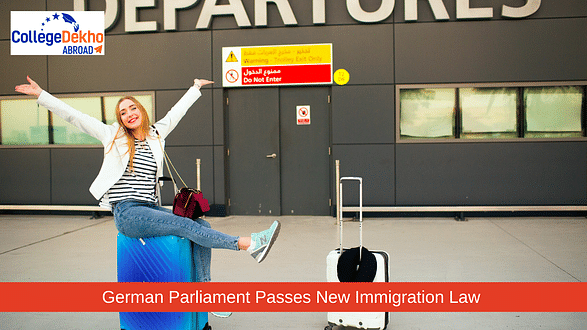The German parliament passed a new immigration regulation on Friday to recruit and attract skilled workers to the nation, which is experiencing an unprecedented labour shortage that is straining the economy.
Germany, like many other European countries, is experiencing a skilled labour shortage. The country's labour shortage reached an all-time high in 2022, according to the Institute for Employment Research (IAB), with 1.74 million empty posts across Germany.
Also Read: Germany to Process 25,000 Student Visas from India in 2023
Labour shortages forced over half of all enterprises questioned by Munich-based research organisation IFO to scale down operations in July of last year. It believes that skilled specialists from outside the EU will fill this void. However, the country's immigration procedure is being hindered by red tape.
The Association of German Chambers of Commerce and Industry (DIHK) reported earlier this year that more than half of Germany's enterprises were struggling to fill openings owing to a shortage of trained personnel.
Also, according to the DIHK's study of 22,000 enterprises, the number of companies having difficulty recruiting was at its highest level ever, with 53% reporting shortages.
Hence, Federal Foreign Minister Annalena Baerbock announced at a news conference held at the Federal Office for Foreign Affairs (BfAA) on 17 January 2023 that modernising the visa procedure would entail 'turning it upside down'. She underlined, along with Federal Chancellor Olaf Scholz, the elimination of bureaucracy and the improvement of technology and system efficiency.
The new proposed immigration law received backing from the ruling SPD, the liberal FDP, and the Greens, securing 388 YES votes, 234 NO votes, and 31 abstentions.
Plans to revise Germany's immigration laws are likely to make it simpler for third-country nationals to work in the country. It will result in an additional 60,000 non-EU employees in Germany per year.
Also Read: German Embassy to Issue Digital APS Certificates to Indian Students
Furthermore, the Skilled Immigration Act revisions prioritise individuals with practical, non-academic skills. Existing requirements for university-educated professionals will also be loosened.
A conservative parliamentary group comprised of the opposition CDU and its Bavarian sister party, the CSU, voted against the measure, claiming that it would make it easier for unskilled employees to enter the country. The far-right AfD party voted no as well.
The law features a point-based system that reduces admission barriers for candidates depending on their professional qualifications, age, and language ability.
Source: The Indian Express
Kickstart Your Study in Germany Process Now!

























